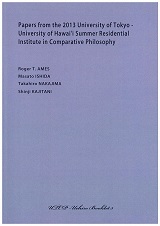
|
Title: | Papers from the 2013 University of Tokyo-University of Hawai'i Summer Residential Institute in Comparative Philosophy (UTCP-Uehiro Booklet 5) |
||
|---|---|---|---|---|
| Author: | Roger T. Ames et al (ed.) | |||
| Publisher: | UTCP | Year: | 2014 | |
| Category: | UTCP-Uehiro Booklet | |||
UTCP-Uehiro Booklet 5 Contents Preface Takahiro NAKJIMA Papers by Institute Faculty 1. Thinking through “Practice” in Classical Chinese Philosophy 2. Nishida Kitarō’s ‘Temporal Plane’ 3. “Practicing Philosophy” After the Disaster on March 11, 2011 4. Naturalness and Normativity Papers by Participants 1. Parallels between Zen Meditation and Psychology: The Positive Influence of Flow on Well-Being 2. Subjectivity in Zen Practice: Comparing Spinoza, Benjamin, and Dōgen 3. The Future is Not Ahead: Rethinking Teleology from Chinese and Japanese Event Ontology 4. Dogen’s Pedagogy: How Passivity Contributes to Education 5. Emptiness and Phenomenological Ambiguity 6. The Perks of Being a Useless Tree 7. How One Becomes What One Is: Mediation of Sein and Werden in Watsuji Tetsurō’s ‘Memorandum’ 8. From the Corner of 1st and 3rd: Shifting the Religion vs. Science Debate to a Relationship between Science and Poetry 9. Nishida Kitarō and the Invention of Society 10. Producing the Genius in Japan: A New Perspective on Nishida’s Middle-Period Aesthetics 11. Practice of Buddhism: Zazen or a Compassionate Heart 12. Nishida Kitarō and Ifa Fuyū: Respective Ideas of ‘The Empire of Japan’ 13. Is Nature Our Mother?: The Complexity of ‘Amae’ and ‘Enryo’ 14. Cultivating Shades of Emptiness: Experiencing the Aesthetic Locality of a Decentered Japan 15. Relational Persons, Relational Ethics: Existential Trust and Its Significance for Contemporary Ethical Discourse 16. Acting Well in the Present Moment: Considerations from Nishida Kitarō’s Concept of Kōiteki Chokkan and Dōgen’s Sansuikyō 17. Questioning the Ancient: Toward a Comparative Study between Dōgen and Blanchot 18. Lu Xun and Hu Shi: A Comparative Approach to Their Early Lives and Their Reception of the Theory of Evolution 19. Riddles with and without Answers: Expressing the Inexpressible |
||||






